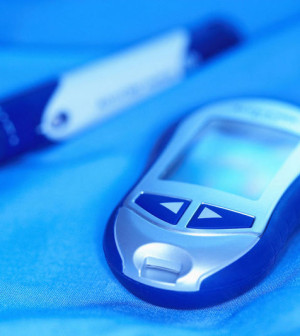- Are You Making This Expensive Thermostat Error This Winter?
- Recognizing the Signs of Hypothyroidism
- 10 Strategies to Overcome Insomnia
- Could Artificial Sweeteners Be Aging the Brain Faster?
- Techniques for Soothing Your Nervous System
- Does the Water in Your House Smell Funny? Here’s Why
- Can a Daily Dose of Apple Cider Vinegar Actually Aid Weight Loss?
- 6 Health Beverages That Can Actually Spike Your Blood Sugar
- Treatment Options for Social Anxiety Disorder
- Understanding the Connection Between Anxiety and Depression
Diabetes Treatment Falls Short as Heart Failure Drug in Study


A drug commonly used to treat diabetes does not help prevent heart failure in non-diabetics who’ve had a heart attack, according to a new study.
Researchers said results from the rigorous clinical trial dispute previous findings that showed the drug, metformin, could have a protective effect on the heart.
“While this glucose-lowering drug is very effective in patients with diabetes and can be safely used in patients with a heart attack, [our data show] it is not of additional benefit in protecting the heart from damage resulting in decreased pump function of the heart,” said the study’s lead investigator, Dr. Chris Lexis, of University Medical Center Groningen in the Netherlands.
Heart attacks often damage heart muscle, which leads to reduced functioning of the left ventricle. This affects the ability of the heart to pump blood. Several animal studies have suggested that metformin — a drug used to improve blood sugar control in people with diabetes — may also help preserve functioning of the left ventricle.
The researchers examined whether or not four months of metformin treatment following a heart attack preserved heart function and prevented heart failure. The study involved 380 heart attack survivors. The patients were randomly assigned to receive a metformin regimen of 500 milligrams twice a day or an inactive placebo pill. Patients were a median age of 59 when the study began, and none had diagnosed diabetes.
Using MRI scans, the function of the patients’ left ventricle was assessed four months after their heart attack.
The study, scheduled for presentation Monday at the annual meeting of the American College of Cardiology (ACC) in Washington, D.C., found no significant difference in the heart function of those who took metformin and those who did not.
“This study did not prove the benefits of metformin in acute myocardial infarction [heart attack] and as such will not change clinical practice as we might have thought,” said Lexis in an ACC news release.
“However, it is noteworthy that metformin started early after heart attack did not adversely affect kidney function and was well-tolerated,” Lexis said. “So our findings do not preclude the use of metformin to treat diabetes in this setting.”
The study authors said more research is needed to determine if a higher dose of metformin could help heart attack patients.
Research presented at meetings should be viewed as preliminary until it has been published in a peer-reviewed journal.
More information
The U.S. National Library of Medicine has more about metformin.
Source: HealthDay
Copyright © 2026 HealthDay. All rights reserved.










